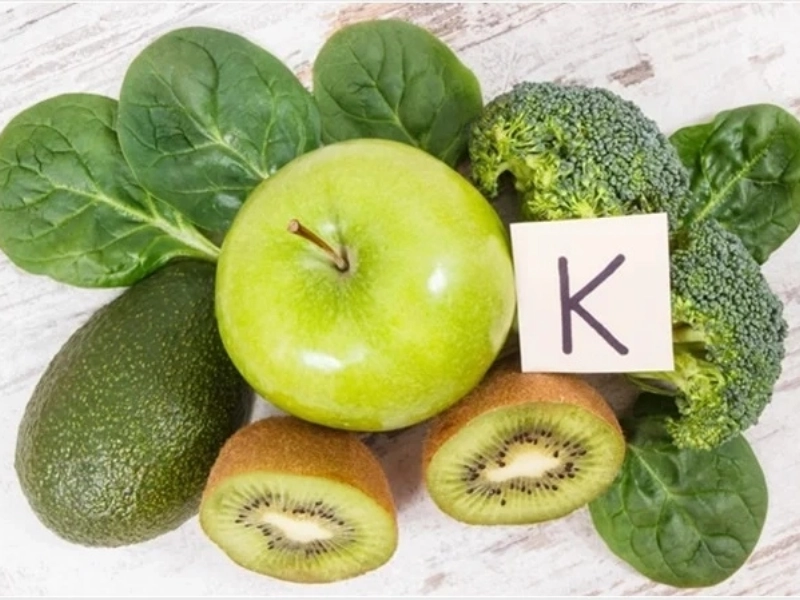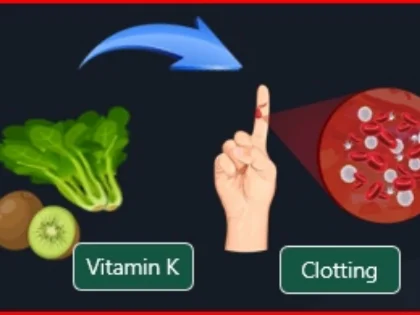The Importance Of Vitamin K For Healthy Aging
Menaphtone, another name for vitamin K, aids in healthy blood clotting. However, evidence indicates that it may also help prevent age-related conditions, including osteoporosis and heart disease. It does much more than that. It might even enhance memory function. To find out more about the significance of this vitamin for healthy aging, continue reading.
It facilitates blood thrombosis.

It promotes bone health.
 It has been demonstrated that vitamin K can halt the progression of long-term conditions such as osteoarthritis and cardiovascular disease (CVD), which can cause sarcopenia, frailty, and early death. A high intake of vitamin K is required to maintain adequate dietary supply, even though low levels have been linked to an increased risk of vascular calcification and death in older adults (as suggested by the Adequate Intake (AI) of 120 mcg/day for men and women).
Studies have revealed the critical role that vitamin K-dependent proteins play in regulating the calcification and development of bone and cartilage. The development of knee osteoarthritis during a three-year period was significantly correlated with low plasma concentrations of phylloquinone at baseline, which are suggestive of subclinical vitamin K deficiency, according to a longitudinal study including 1,180 US people. Similarly, a long-term study that tracked 1323 Danish women going through menopause for 11 years discovered an inverse relationship between plasma phylloquinone and lumbar spine and femur fractures.
It has been demonstrated that vitamin K can halt the progression of long-term conditions such as osteoarthritis and cardiovascular disease (CVD), which can cause sarcopenia, frailty, and early death. A high intake of vitamin K is required to maintain adequate dietary supply, even though low levels have been linked to an increased risk of vascular calcification and death in older adults (as suggested by the Adequate Intake (AI) of 120 mcg/day for men and women).
Studies have revealed the critical role that vitamin K-dependent proteins play in regulating the calcification and development of bone and cartilage. The development of knee osteoarthritis during a three-year period was significantly correlated with low plasma concentrations of phylloquinone at baseline, which are suggestive of subclinical vitamin K deficiency, according to a longitudinal study including 1,180 US people. Similarly, a long-term study that tracked 1323 Danish women going through menopause for 11 years discovered an inverse relationship between plasma phylloquinone and lumbar spine and femur fractures.
It supports cognitive processes.
 Memory is one of the many biological processes in which vitamin K is active. In a study involving rats, a type of vitamin K-2 was discovered to improve their cognitive function. Furthermore, vitamin K-2 inhibits genetic pathways that may lead to tumor development in cancer cells.
In a cross-sectional study involving 325 adults over 65, higher plasma phylloquinone and lower plasma (dp)ucMGP concentrations were associated with improved global cognitive performance, as measured by the Mini-Mental State Examination (MMSE).
According to certain research, consuming a lot of cruciferous and green leafy vegetables is also linked to slower rates of dementia and cognitive decline. Furthermore, a recent review compiled data demonstrating that because vitamin K is involved in the activation of vitamin K-dependent proteins, the central nervous system is susceptible to vitamin K insufficiency. It's probable that this sensitivity plays a role in the etiology of dementias like Alzheimer's. Several studies also suggest that by limiting oxidative stress and the activation of the inflammatory cascade, the special properties of the menaquinone-4 vitamin may offer protection against neurodegeneration.
Memory is one of the many biological processes in which vitamin K is active. In a study involving rats, a type of vitamin K-2 was discovered to improve their cognitive function. Furthermore, vitamin K-2 inhibits genetic pathways that may lead to tumor development in cancer cells.
In a cross-sectional study involving 325 adults over 65, higher plasma phylloquinone and lower plasma (dp)ucMGP concentrations were associated with improved global cognitive performance, as measured by the Mini-Mental State Examination (MMSE).
According to certain research, consuming a lot of cruciferous and green leafy vegetables is also linked to slower rates of dementia and cognitive decline. Furthermore, a recent review compiled data demonstrating that because vitamin K is involved in the activation of vitamin K-dependent proteins, the central nervous system is susceptible to vitamin K insufficiency. It's probable that this sensitivity plays a role in the etiology of dementias like Alzheimer's. Several studies also suggest that by limiting oxidative stress and the activation of the inflammatory cascade, the special properties of the menaquinone-4 vitamin may offer protection against neurodegeneration.
It promotes heart health.
 In addition to being essential for heart health, bone strength, and blood clotting, vitamin K also prevents hardened arteries from forming. Vitamin K activates vascular tissue proteins that prevent calcium from building up inside arterial walls. In the absence of enough vitamin K, these proteins become less active, raising the risk of atherosclerosis.
According to a recent study, individuals with low blood levels of vitamin K had a 19% higher risk of dying from heart disease than those with adequate levels of the nutrient. After classifying participants based on blood levels of vitamin K, the researchers followed them for a period of 13 years.
Researchers discovered that vitamin K levels were higher in people who consumed a lot of leafy green vegetables and vegetable oils than in those who consumed a lot of meat, fermented foods, and cheese. This implies that eating a variety of foods is crucial to getting adequate vitamin K.
In addition to being essential for heart health, bone strength, and blood clotting, vitamin K also prevents hardened arteries from forming. Vitamin K activates vascular tissue proteins that prevent calcium from building up inside arterial walls. In the absence of enough vitamin K, these proteins become less active, raising the risk of atherosclerosis.
According to a recent study, individuals with low blood levels of vitamin K had a 19% higher risk of dying from heart disease than those with adequate levels of the nutrient. After classifying participants based on blood levels of vitamin K, the researchers followed them for a period of 13 years.
Researchers discovered that vitamin K levels were higher in people who consumed a lot of leafy green vegetables and vegetable oils than in those who consumed a lot of meat, fermented foods, and cheese. This implies that eating a variety of foods is crucial to getting adequate vitamin K.









